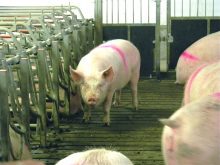Ethanol vote fails:A proposal
to end subsidies for the U.S. ethanol industry failed a key vote in the Senate June 14. The Senate voted 59 to 40 against limiting debate on the measure from Republican Tom Coburn that would have ended the federal ethanol tax credit and the tariff on ethanol imports before they were scheduled to expire at the end of the year. The vote comes as U.S. lawmakers are looking for ways to cut spending and as criticism mounts globally over subsidies for corn-based ethanol, blamed by some for pushing up food prices. Mice attack:An exploding population of mice is threatening some of Australia’s key wheat-growing areas, feeding on new crops and posing a threat to the 2011-12 crop. “I’ve got my friends catching up to 90 mice a night in their houses,” said Chris Groves, a grower in New South Wales state.
Read Also

The joys of fishing from shore
Manitoba has many lake and river shorelines to drop a fishing line without the cost of a boat, making shore fishing more accessible, and anglers can still catch impressive fish.
Millions of hectares of recently planted canola have already been destroyed by the plague, according to the National Oilseeds Federation (NOF). Recently planted wheat crops are in danger from the plague that stretches from Queensland to South Australia.
Shocking theft:Amaranth
RCMP are investigating the theft of an electrical fencing system reported stolen June 13 from a yard in the RM of Westbourne. The red Speedrite 300 Energizer system, is valued at $630. Anyone with information about this incident is asked to contact the Amaranth RCMP at 843-2309 or Crime Stoppers at 1-800-222-TIPS (8477).
– Staff
The sad truth:Canada’s barley
crop will likely produce the second-smallest harvest in nine years, keeping global malting barley supplies tight and possibly driving up beer prices, industry officials say.
Western Canada’s barley harvest will be 7.7 million tonnes this year, up 10 per cent from a puny crop last year, according to a Canadian Wheat Board forecast this week.
Crop quality is also in doubt with growth two to three weeks slower than normal because of late planting in wet conditions.
Still rising:World commodity prices will keep up their relentless push higher this decade compared to previous years, supported by burgeoning demand for food and fuel as well as knock-on effects from energy costs, the FAO and OECD said.
The report said commodity prices in real terms are projected to average up to 20 per cent higher for cereals (maize) and up to 30 per cent for meats (poultry) over the 2011-20 period compared to the last decade.
World food prices hit a record high earlier this year, triggered mainly by bad weather.
Don’t be a lightning rod:
Lightning kills on average 10 Canadians and injures approximately 100-150 others annually Environment Canada says. “When thunder roars, go indoors,” the department says in a release. And once in a safe location, specifically a house or all-metal automobile (not a convertible top), remain there for 30 minutes after the last rumble of thunder is heard before resuming your outdoor activities. EC has updated its “Lightning in Canada” site with new diagrams, pictures, videos and audio. Go to: http://www.ec.gc.ca/foudre-lightning/default.asp? lang=En&n=73364E34-. – Staff Cost prohibitive:The cost of farming algae as a biofuel must be cut by about 90 per cent if it is to become commercially viable and reduce pressure on food prices, according to Dutch scientists. The oil content in algae ranges from 20 to 60 per cent, which means that between 20,000 and 80,000 litres of oil can be produced per hectare of algae a year, according to Wageningen University research. A hectare of palm oil plantation produces about 6,000 litres of oil per year.
But the cost of production of biofuel from algae is 10 times the cost of palm oil-derived biofuel.
Community builders:Cargill’s
Victory Hybrid Canola Reaping Returns Community Outreach Program was a big success, the company says. 4-H teams were given the opportunity to receive up to $2,500 from Victory Canola and Cargill to conduct projects that focus on health and nutrition, education and/or the environment. The initiative resulted in a school breakfast program in Binscarth, healthy menu options at the Miniota community centre, recycling programs in Warman, Sask. and improvements to the Paradise Hills Care Home in Saskatchewan.
– Staff
Canada hosts Cairns:Canada
will take a leading role in agricultural trade relations by hosting the 36th Cairns Group Ministerial Meeting. Held in Saskatoon from September 7-9, 2011, the meeting will be co-chaired by Canada and Australia and will focus on World Trade Organization (WTO) negotiations on agriculture and other agricultural trade-related issues. The Cairns Group is a coalition of 19 agricultural exporting countries with a commitment to strengthening agricultural trade. Over 150 participants from more than 25 countries are expected to gather in Saskatoon. – Staff


















